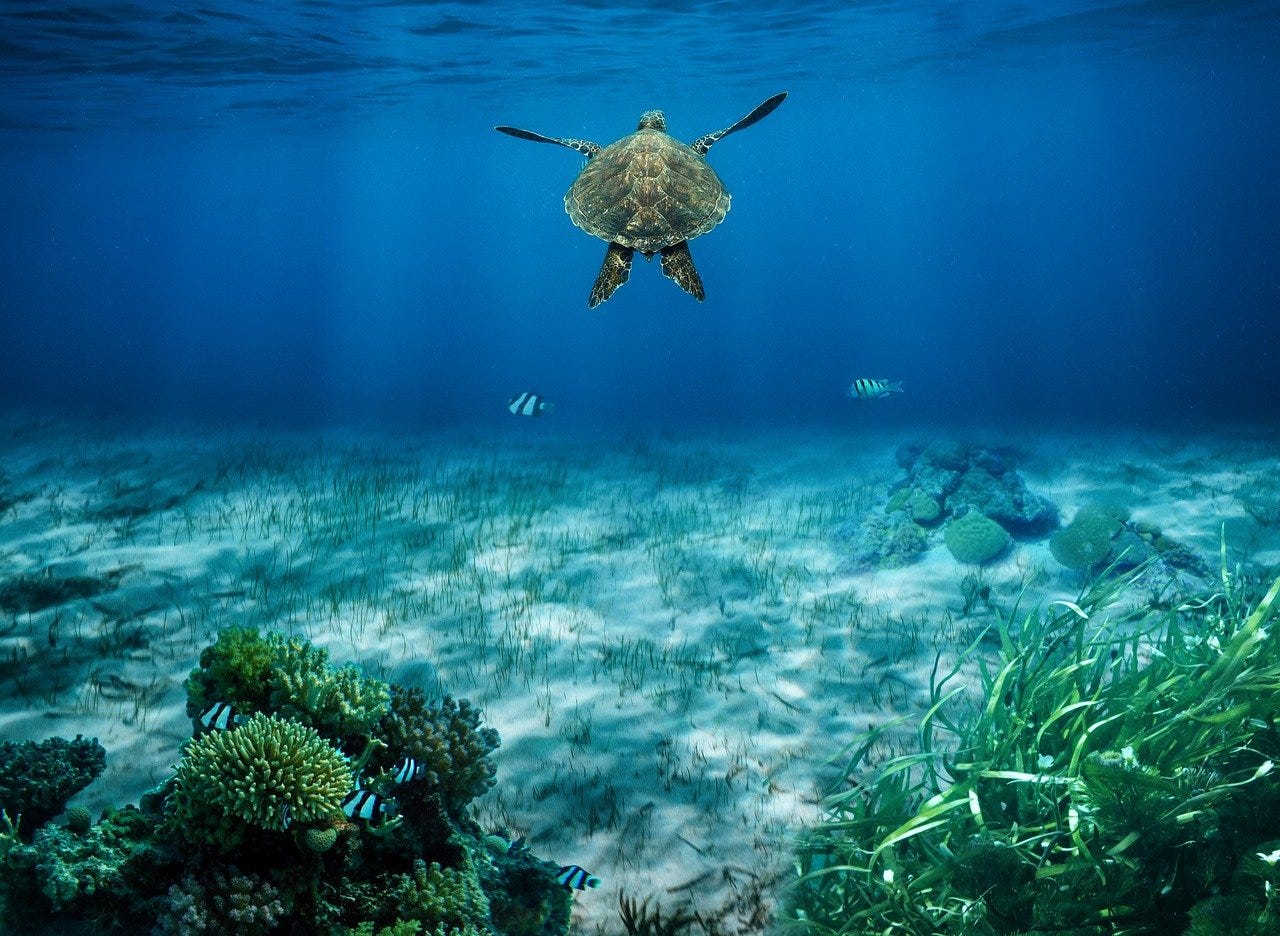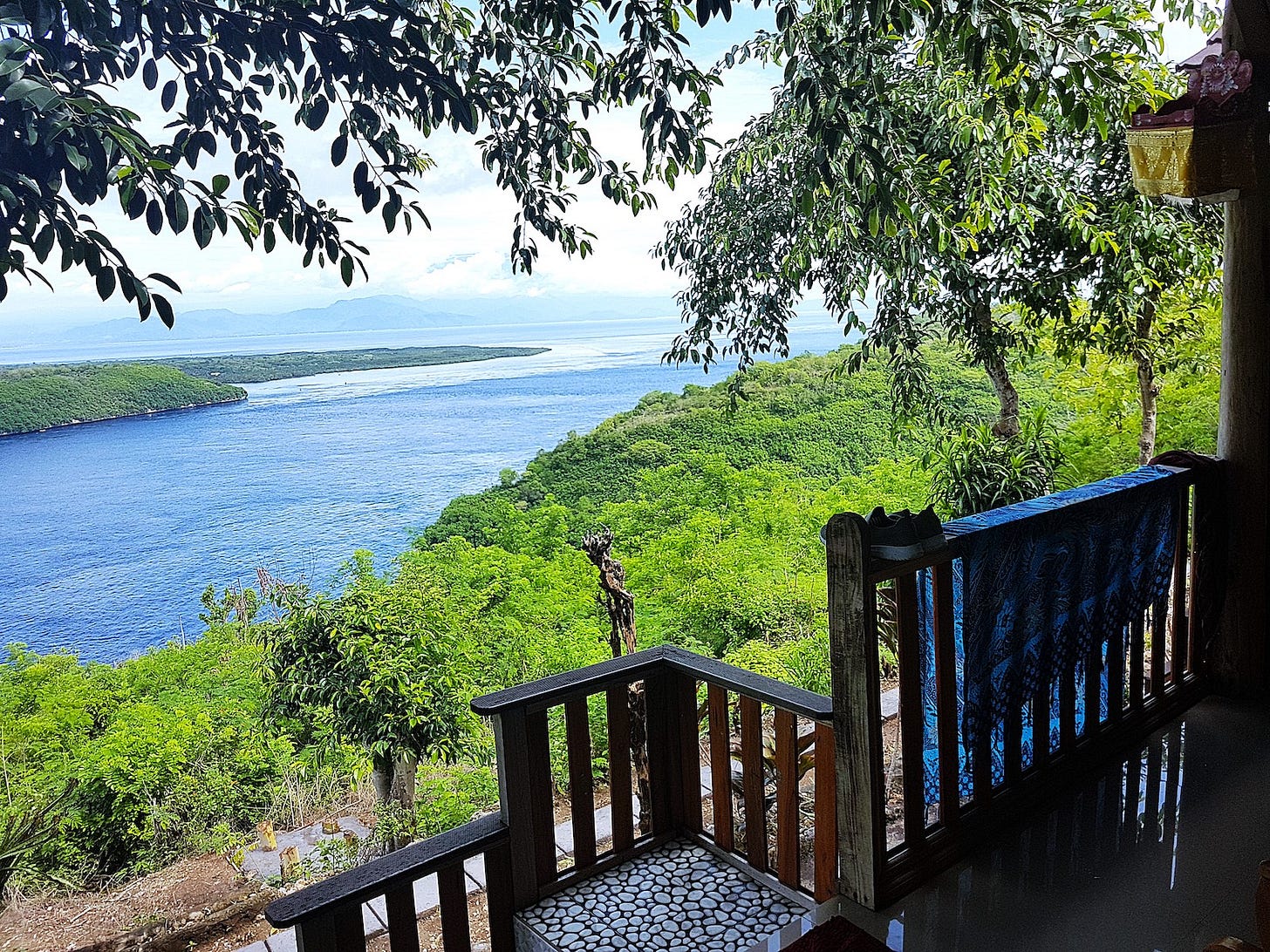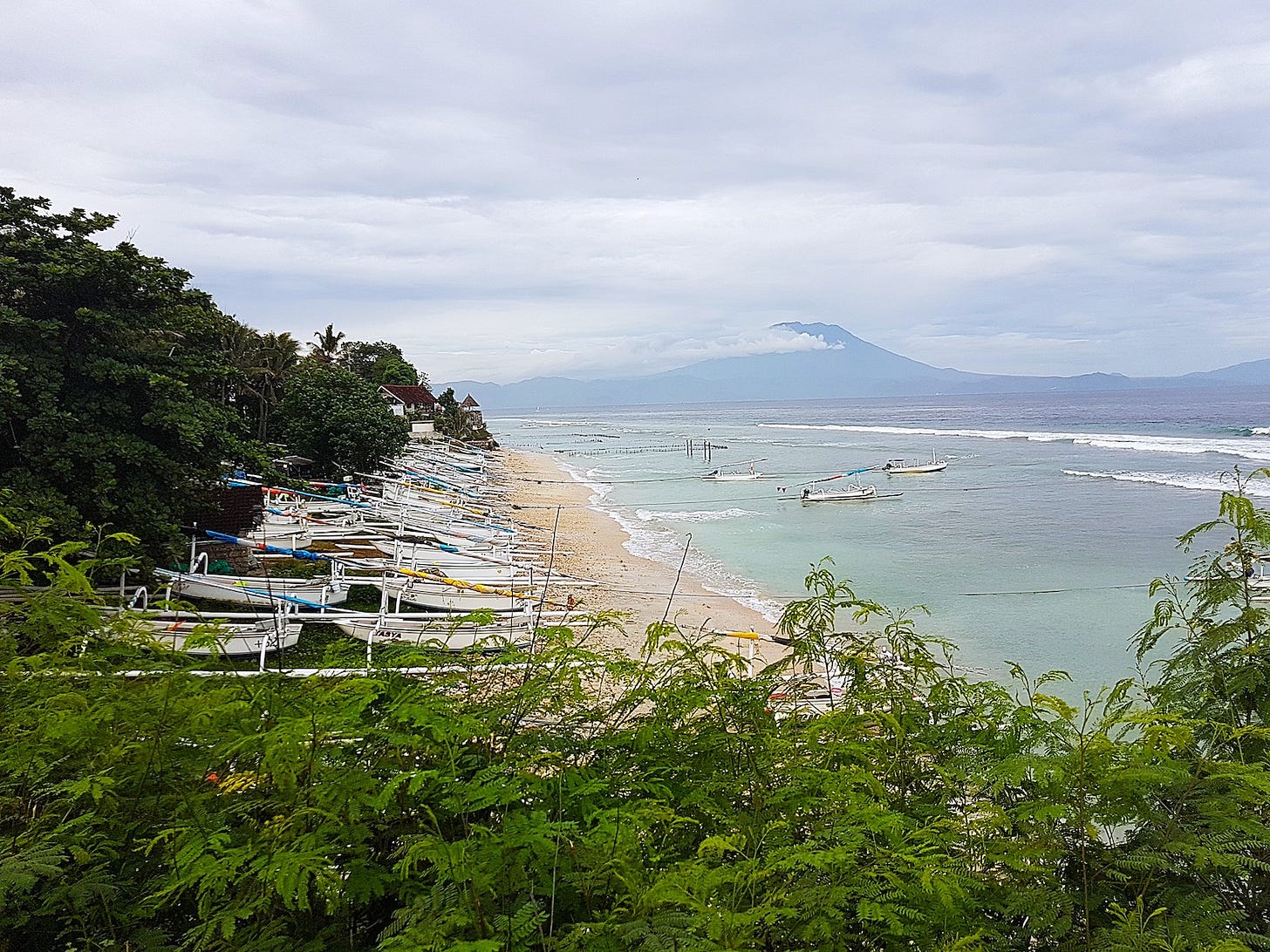As I walked down the road to the bay, the guest house dog trotted beside me. I bent down and stroked her short black fur. The word “guardian” popped into my head and settled there like a clown fish in an anemone. Yet there was a slight undertow of anxiety in my guts. It had been a week of relative jeopardy (but isn’t every week like this in the world’s less regulated lands?) involving death-defying scooter drives down perilous ridges on pencil strips of broken tarmac, venomous snakes lurking in bathing pools, and of course strong ocean currents.
You see, Indonesia entertains a massive Throughflow of water from the Pacific Ocean in the north down to the Indian Ocean in the south, and it slices through the middle of the archipelago like a sharp blue knife. Nusa Penida is one of the islands that takes the brunt of this enormous current. And in a roundabout way, that’s why I wanted to dive and snorkel there. Manta rays, sharks, marine turtles, mola molas, and plenty of other magnificent species enjoy the fruits of the Throughflow, as do some refreshingly healthy coral beds stoked by the rush of ocean water as it’s sucked between Bali and Lombok.
I reached the bay coated in a film of sweat, desperate to sink beneath the waves to cool off. That blue underworld is my happy place. It’s a realm that moves in a completely different rhythm to the overworld. Sometimes above the waves there can be rain, storms, and huge swells, while beneath there is nothing but a gentle floating indigo. Other times it’s the opposite.
I kicked off my shoes and flexed my toes in the black tinged sand. It was then I saw him. A local wearing a black udeng on his head walked towards me. He was grinning from ear to ear and waving a large, very honed looking sickle at me. Was it that I was alone in the bay? Was it the unsettling symbolism of the sickle? Was it a week of adrenalin lurking in my body? Anyway, I felt unnerved.
I hung my rucksack in a baby coconut tree and tried to ignore the man. He wasn’t having it though.
“You snorkel?” He asked, taking up a seat in the gazebo right next to where I had hung my bag. His face was disk of shrivelled leather torn open by a row of betel-stained teeth. But his eyes, they were as keen as black razors.
“Yes,” I replied, irritated.
“You have snorkel?” He was like a journalist doorstepping a politician.
“Yes, I have my own.” I waved my mask at him and turned to the sea. Inhaling, I pulled my power around me like cape, sensing I needed it.
“You start here,” the man pointed at the right side of the bay, “And go here.” His hand swept along the bay. “Careful. Sea strong.”
“I know,” I replied, growling a little at the offering of unsolicited advice. “I swim here many times,” I said (and if I want your help, I’ll ask for it).
The man chortled. Then, much to my annoyance, he settled back in the gazebo as if to spectate.
I pulled my mask down and trod into the blue soup. The waves were swelling ahead and I knew to push through them to the calmer water beyond. There was a small margin of sea between the surf and the infernal sucking currents of the channel beyond, that harboured some glorious corals and anemones: elkhorn, lettuce leaf, sea fans, brain coral, saddle carpet, and my personal favourite, the vase sponge.
As I pushed under the water (it was no more than a metre high) I gasped at the thick blanket of life I was swimming into. I was surrounded by fish of every colour. Every shape. Every size. Huge puppy-eyed box fish drifted like buoys in a sea of butterfly fish, surgeon fish, parrot fish, and spotted sweetlips. The fish clouds parted to let me through, revealing striped green and pink angel fish, unicorn fish, and blue tipped trevallies. To swim in this field of iridescence is both amazing and marginally alarming. Everything is in there, from coral snakes to trigger fish.
I pushed through the surf. It was tough going, far bumpier than the previous days. I could feel the Neptunian fist of the current yanking me westwards and I kicked against it to give myself a little more time before I was pushed to the other side of the bay. Then I received my reward. The sea bed opened up into a glorious field of corals. I saw a lionfish and a luminscent yellow ribbon eel both skulking in crevices while rainbows of fish flowed around. People take drugs to experience this kind of thing, and yet this wonder is all there beneath the waves for anyone with a mask.

A large sea turtle kicked off just ahead of me, carrying her ancient lineage in her bones. I tried not to think of the plastic straws, bags, and bottle tops on the beach. This bay was probably the cleanest I’d seen in Indonesia, but that isn’t much to get excited about. Frankly, it’s a disaster, and one I still haven’t worked out how to approach either mentally or physically.
As I ducked and pivoted between both waves and current, I thanked those who went before me, the first snorkellers and divers who explored these realms, those who invented a plethora of equipment so that all of us humans can enjoy the underworld and swim with the gilled and web-footed ones. I felt that diver lineage stretching both forwards and backwards through the currents of time; frogmen and women, fisher people, sponge collectors, and free divers all linked by the underwater underworld.
The Wave
But I was breathing hard. The current was erratic and tough going and I could feel my body aching. Using the waves as my rhythmic propeller, I turned and followed the coral-gilded grooves on the seabed to make my way towards the shore. It was all going so well, and I congratulated myself on having mastered this little stretch of Nusa Penida. In a small gush of hubris I stuck my head above the surface, wondering about the man with the sickle on the gazebo. As Finagle’s law would have it, at that very moment an inordinately large wave chose to crash directly upon my head. I spluttered but gripped the snorkel between my teeth for all I was worth. It was pointless though, because it was then I realised my mask was gone, completely ripped off my skull and dragged Poseidon only knew where. Furthermore, another sizeable wave was on its way, and I was still a good twenty metres from the shore.
I flinched, knowing exactly how much sea life was swimming around me. I was blind now. Eyeless. Swimming in a warm tureen of spiny, scaly beasts who were all far better at this than me.
“Shit! I need your help now, Sea!” I shouted at the water. “Guide me.”
“Ah, you’re awake now, are you?” The sea gurgled. “Fear not, I’ll escort you out.” The warm blue chortled as another wave rolled in. This time though, it broke just beyond me, pushing me smoothly in the right direction. Suddenly I could feel the body of the sea supporting me. I was going to be OK.
“I don’t get it! Why did you do that? Why did you scare me?” I spoke on the inside, but the sea understood.
“Complacency is never a good thing.”
“I wouldn’t have called myself complacent. I was paying attention.”
“Well, if you had been paying attention, you’d have heard me and still have your mask. He he he. But no harm done, my friend. At least you’ve opened your ears and eyes now.”
The shoreline was fast approaching now, so I threw my snorkel pipe ahead of me. Then I waded and stumbled back over the rocks to the beach. It was then I spotted the wiry man in the gazebo. He was grinning. I had to laugh back.
“It took my mask!” I said, pointing to the sea.
“Oh no,” said the man, pushing his black turban back. “You lost it?” His eyebrows raised in genuine concern.
“Yes, but at least it didn’t take me, it’s okay,” I added.
“Ha ha, yes. It’s strong today.” The man’s leathery face cracked into a field of kindly lines. And suddenly I realised. He’d been sitting there, not to spectate or gloat, but as a guardian. He’d been watching out for me.

Never alone
I’ve travelled extensively to foreign lands, mostly alone, and to some fairly precarious parts of the planet. I have crossed Iran from east to west, sat in bullet-riddled buses in Pakistan, turned blue with altitude sickness in Ladakh, pelted round various parts of Asia on a scooter, and lived alone in a mud hut on a Turkish hill. But I was never alone. Every time there have been guardians, souls who seem to turn up to protect or offer shelter. Angels hide in remote villages, or in disguise as fellow travellers or animals.
Sometimes I wonder why I keep surviving, and why the reaper’s blade keeps missing my head. But I did hear what the sea said that day. We can only feel the support of our world if we are actually present and awake in it. If we are fully connected to it. We have to be plugged into the planet to access her feisty green juice, to hear the guidance of her elements. And to do that we have to step out of our very opinionated, cocksure, but infinitely misled heads.
Just like the Ceningan channel, this world full of everything. Certainly not every being that crosses our paths has our best interests at heart, which is why the sea is right: We need our eyes and ears open, not in constant anxiety, but in something I’d call empowered presence. And in the surging blue wisdom of that moment, the guidance is always there.
On the theme of sea guardians:
Indonesia, just like the rest of the world as we know it, offers a mixture of inspiring and depressing environmental stories. The plastic rubbish was indeed dreadful, and Nusa Penida in particular was heaving under the stuff. We could have seriously used a plastic ban in the last UN treaty in December. It was scuppered by the oil lobbyists. I’ll be speaking more about my thoughts on this in an upcoming article.
But on the plus side
There are many concerted and relatively successful efforts to reforest coral gardens throughout Indonesia. Personally I like the way the attempts are an unorganized mixture of local grassroots, academic, and private enterprise, as it has enabled natural spontaneity, local connection to the projects, and innovation by people on the ground who know the reefs. You can read more at the links below:
https://www.biorock-indonesia.com/en/is-indonesia-successful-in-restoring-coral-reefs/
Indonesia is also spearheading the expansion of marine protection zones in the region. The Government of Indonesia has committed to establishing 32.5 million ha of marine protected areas by 2030.
On a practical level, by which I mean taking into account how locals on the ground can feasibly earn a crust in marine protected areas, Indonesia appears to be experimenting with various kinds of eco/scuba tourism. As a scuba diver myself this delights me, because I find it one of the least destructive tourist activities out there. It’s a fantastic way of increasing awareness in people of the majesty of our underwater world, with very low impact. You basically only need a small boat and some scuba equipment to dive, unlike the rest of tourism with its massive concrete infrastructure, forest hacking resorts, Goddamn swimming pools, suncream coated tourists, and endless plastic crap.
The Nature of Freedom Podcast
In the next podcast for paid subscribers I’ll be discussing more about “empowered presence,” and my own strategies for hearing the elements and discerning between bonafide Earth guides and trouble makers.










Indonésie and the sea. Above, beneth! Thank you!!!